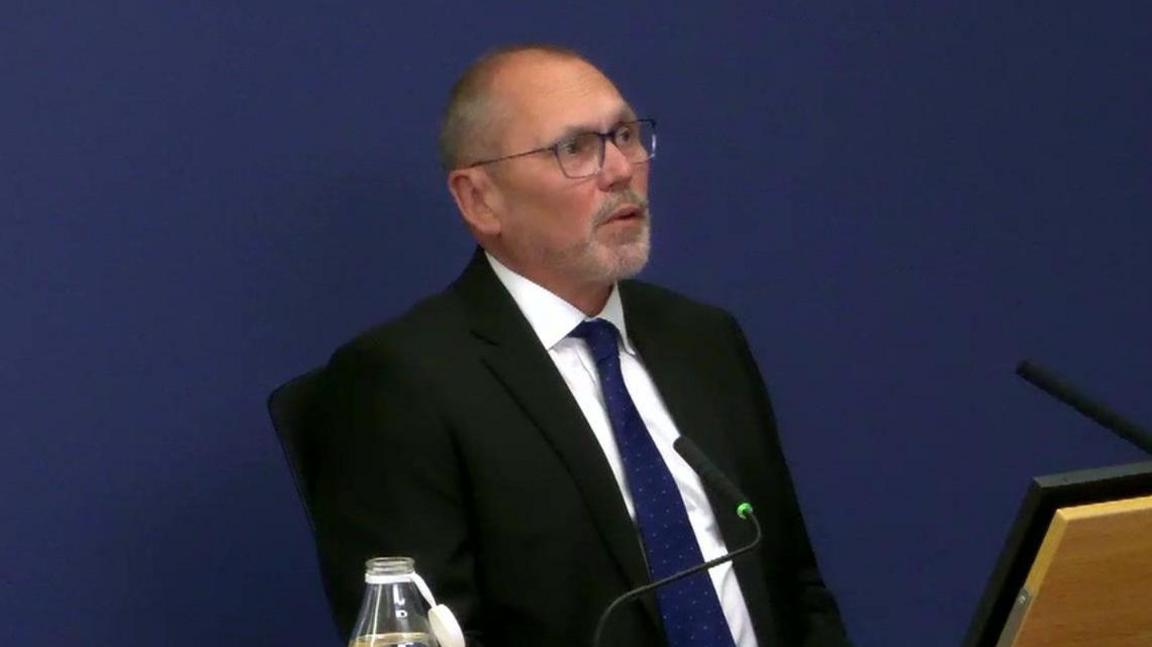My emails look ludicrous, says ex-Post Office PR boss

- Published
The Post Office's former communications director Mark Davies has admitted that emails he sent denying there were problems with the Horizon IT system look "ludicrous" with hindsight.
Hundreds of sub-postmasters were blamed and prosecuted over accounting errors caused by the faulty software.
At the Post Office inquiry on Tuesday, Mr Davies was shown emails by lawyer Julian Blake in which he had suggested journalists were "campaigning" against the Post Office.
The prosecutions between 1999 and 2015 resulted in what is widely regarded as one of the worst miscarriages of justice in British history.
Emails from Mr Davies about media coverage of the scandal were also displayed at the hearing, with one showing him joke about being "at the heart of a corporate cover-up".
The message read: "The reality is a hard story to tell, and some distance from the picture painted by a determined band of adversaries.
"In our case, we are up against a campaign group, a few journalists (mainly from the BBC) and some MPs.
"And you have to hand it to them: they know what they are doing in terms of mounting a campaign.
"It's just that - whisper it quietly - all is not what it seems."
‘I thought mum left me, she’d been sent to prison'
- Published27 January 2024
Post Office 'misled and deceived me' says key lawyer
- Published9 May 2024
During his time at the Post Office, Mr Davies presided over an aggressive media strategy, particularly when it came to the BBC and a 2015 Panorama programme which featured crucial whistleblower testimony.
Julian Blake, counsel to the inquiry, questioned Mr Davies about his reaction to the BBC’s coverage of a 2014 report by Second Sight - the independent forensic accountants appointed to investigate allegations that Fujitsu's Horizon software was producing anomalies in branch accounts.
He displayed an email in which the former PR boss called BBC coverage “straightforwardly inaccurate” and "sloppy journalism in the extreme".
Mr Davies - a former BBC employee - replied that the BBC was making damaging claims about Horizon, and that the Second Sight report had not acknowledged any "systemic issues" with the software.
Who said anything about "systemic issues"? Mr Blake asked.
Mr Davies replied that the coverage from many news outlets at the time suggested Horizon was “dodgy” and we didn’t have that information at the time.
"These are the lines that are repeated year after year after year,” said Mr Blake, raising his voice. "Why can’t you in September 2014 simply accept that Second Sight had identified issues with Horizon?"
Mr Davies said he accepted in hindsight that there were issues with Horizon, and added that he had never sought to mislead anyone.
He also denied that wanting to line up a "specialist media lawyer" hours after the suicide of sub-postmaster Martin Griffiths in September 2013 was because of a desire to combat negative publicity.
He told the inquiry the request for a lawyer's assistance was because he wanted guidance on reporting suicide.
And in a statement submitted to the inquiry, he refuted that he had sought to "cover up issues with Horizon".
He said: "I did not, as been alleged, seek to 'cover up' issues with Horizon - indeed quite the opposite.
"But because I did not have access to all the facts, I clearly played a part in prolonging the pain and injustice for those innocent people who were wrongly accused or whose convictions were unsafe.
"I am deeply sorry for that."
The fifth phase of the public inquiry, expected to run until the end of July, is looking at a number of issues including whistleblowing, redress, complaints and the monitoring of Horizon.
Former Post Office chief executive Paula Vennells is set to give evidence in the next few weeks.
The organisation has come under huge scrutiny in the wake of an ITV drama, Mr Bates Vs The Post Office, which put the human cost of the scandal back in the spotlight.
More than 900 sub-postmasters were wrongly prosecuted for theft and false accounting because of incorrect information from a computer system called Horizon.
The Post Office itself took many cases to court, prosecuting 700 people between 1999 and 2015.
Many are still waiting for full redress despite the government announcing that those who had had convictions quashed are eligible for £600,000 payouts.
On Tuesday, emergency legislation that will clear the name of Scottish sub-postmasters wrongly convicted was also introduced in Holyrood.